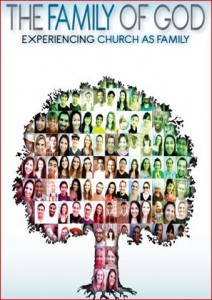As a team sport (see yesterday’s devotion) each person has a particular position to play in the family: husband, wife, father, mother, son, daughter, grandfather, grandmother, etc. Each of these carries with it some general directions and  instructions regarding what responsibilities are to be fulfilled by each party on the team. These days there are incredible debates over what responsibilities should be assigned to each role in a family. Surely things have changed radically over the past couple of millenniums but in many respects the more things change the more they remain the same. The scriptures lay out the responsibility of the husband; love and sacrifice for his family. The wife is to love and respect (submit to) her husband. The children are to obey their parents. Parents are to nurture, not abuse, their children with their God given authority in the home. The problems I’ve encountered over the years in marital counseling are all related to one person in the family rejecting, abusing, denying, or rebelling against their God given responsibility as part of the family. A husband refuses to sacrifice, the wife refuses to respect or a child is disobedient. In my opinion, all family discord can be classified under one of these issues.
instructions regarding what responsibilities are to be fulfilled by each party on the team. These days there are incredible debates over what responsibilities should be assigned to each role in a family. Surely things have changed radically over the past couple of millenniums but in many respects the more things change the more they remain the same. The scriptures lay out the responsibility of the husband; love and sacrifice for his family. The wife is to love and respect (submit to) her husband. The children are to obey their parents. Parents are to nurture, not abuse, their children with their God given authority in the home. The problems I’ve encountered over the years in marital counseling are all related to one person in the family rejecting, abusing, denying, or rebelling against their God given responsibility as part of the family. A husband refuses to sacrifice, the wife refuses to respect or a child is disobedient. In my opinion, all family discord can be classified under one of these issues.
The same is true for the Family of God, the church. Each person has been gifted, shaped by God, to perform certain functions or play certain positions in the family. Every church discord I’ve ever experienced or heard about amounts to the same thing. One of the people, playing a particular position in the church family, rejects their role and usurps the roles of others assigned by God. As I mentioned several days ago that Psalm 68, verses 5 and 6 tells us that God is the one who places us in families. We are where we are because of God’s design and personal plan for our lives. The Church is the family that God designed, Jesus builds, and the Spirit oversees and directs. The problem comes when family members rebel from God’s program.
The wisest man in the world, Solomon, wrote in his excellent book of wisdom called “Proverbs” that there are certain things that God hates. The Hebrew word for hate does not carry the same connotation that our word does, but it still tells us what deeply displeases God. He say there are six things, then he pauses and says, “no wait, there are seven.” That little phrase puts all the attention on the 7th thing. Here is what they are according to Chapter 6, verses 17-19, “haughty eyes, a lying tongue, and hands that shed innocent blood, a heart that devises wicked plans, feet that make haste to run to evil, a false witness who breathes out lies, and one who sows discord among brothers.” These are called “abominations” to God. A divisive player can destroy a team, a family and a church!







